Japanese nuclear officials race to avoid disaster as radiation levels in sea rocket
Thursday, March 31, 2011
Radiation levels have rocketed in the sea near the Fukushima I nuclear plant in Fukushima, Japan, as government officials admitted on Wednesday they are fighting a constant battle to halt the growing nuclear crisis which began after the devastating earthquake and tsunami which struck the country earlier this month. The news comes after the chief executive of plant operator Tepco, Masataka Shimizu, was hospitalized with exhaustion on Tuesday.
Levels of Iodine-131 off the coast of the plant were recorded to be almost 3,400 times the legal limit, the Japanese nuclear safety authority, Nuclear and Industrial Safety Agency (Nisa), said. The levels of radiation are the highest recorded since the crisis began. Officials are now struggling to find how radiation is leaking from the plant, and have prohibited fishing in the area. A spokesperson for Nisa insisted there was no immediate threat to humans from the leakage into the sea. "We will find out how it happened and do our utmost to prevent [the levels of radiation] from rising," he said.
The situation at the nuclear plant is considered dire after the Japanese government accepted an offer of assistance from the United States and France. An experienced nuclear engineer has warned the reactor core at No. 2 reactor at the plant may have melted. Workers at the plant are battling to cool the reactors and stop further radiation leakage.
If the crisis continues to escalate, the Japanese economy could sustain serious damage as fisherman are banned from working in the area of contaminated water. "The worst-case scenario is that this drags on not one month or two months or six months, but for two years, or indefinitely," an analyst, based in Tokyo, said. "Japan will be bypassed. That is the real nightmare scenario." A spokesperson for the Japanese government warned officials "are not yet in a situation" to say when the race to avert the crisis from escalating will end.
Masataka Shimizu, the chief executive of Tepco, was transported to hospital with dizziness and hypertension as criticism of the company continues to build. Last week, three workers stepped into contaminated cooling water as they tried to replace cables at one of the reactors of the plant and two were hospitalized. The workers have now been released from the hospital.
Tepco has apologized to those affected by the nuclear emergency in a statement released March 18. "We sincerely apologize to all the people living in the surrounding area of the power station and people in Fukushima Prefecture, as well as to the people of society for causing such great concern and nuisance," the company said in the statement. The sale of numerous vegetables grown near the plant has been banned by authorities after they tested positive for radiation. Officials have also warned parents not to give tap water to infants after it emerged that it may have become contaminated. A large area around the plant has been evacuated.
Sources
- Justin McCurry. "Radiation rises in seawater near Fukushima plant" — The Guardian, March 30, 2011
- "High radiation levels found in seawater near Fukushima plant" — CNN, March 30, 2011
- "Japan nuclear crisis: Power company boss in hospital" — tntmagazine.com, March 30, 2011




